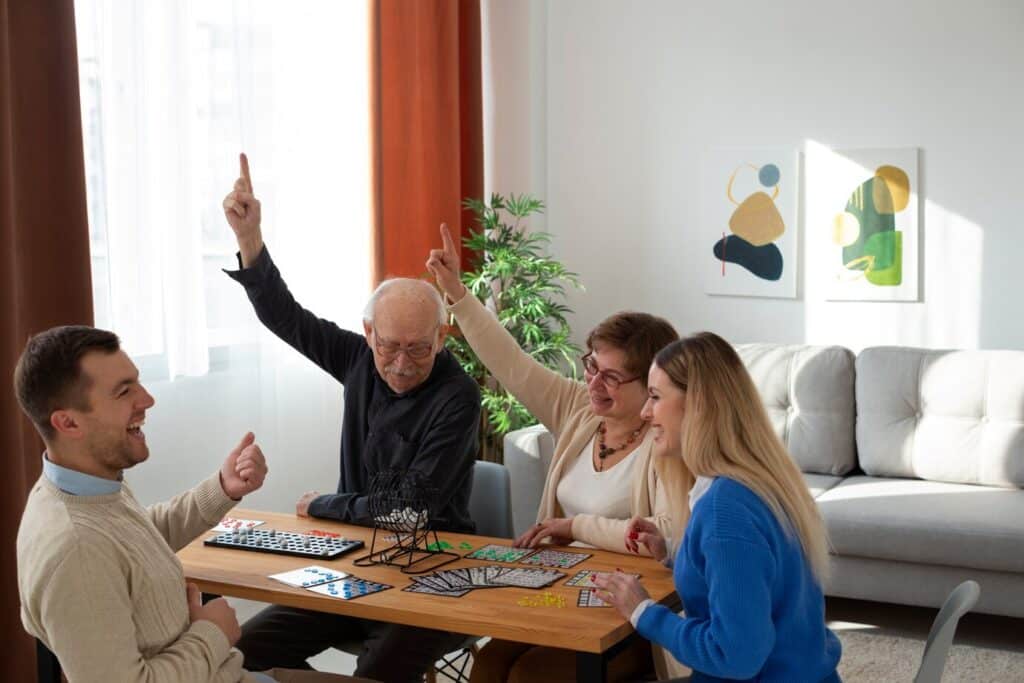Keeping Seniors Active in Memory Care Through Meaningful Activities
Seniors active in memory care often experience life in more vibrant and fulfilling ways. At Westmont of Morgan Hill, each day is thoughtfully structured with experiences designed to engage residents on emotional, cognitive, physical, and social levels. These activities go beyond passing time—they’re essential for maintaining dignity, promoting joy, and enhancing well-being. Carefully chosen programming encourages participation, connection, and personal expression. Whether it’s calming activities for dementia patients or creative art projects, everything is curated to suit each resident’s unique needs.
Seniors deserve opportunities that respect their individuality while gently challenging their capabilities. Our goal is always to enrich their lives with purpose, laughter, and community. Through this, we see how seniors thrive in the right environment. Let’s explore how tailored programming makes all the difference. Discover more here.
The Power of Personalized Memory Care Activities
Personalized experiences allow seniors to feel seen and understood—something significant for those navigating memory loss. It brings familiarity and emotional comfort when caregivers align daily routines with individual histories and preferences. It might be a favorite flower to tend in the garden or a song from their youth playing during music therapy. These intentional touches anchor them in the present while gently connecting them to the past.
Group activities that feel natural and enjoyable for memory care patients often lead to better participation. Rather than focusing on clinical goals, these moments promote natural connections and emotional expression. And when a resident’s favorite activity becomes a daily tradition, it cultivates pride and routine. We’ve seen firsthand how minor adjustments can spark big emotional rewards.
Through family collaboration, we create personalized care plans that elevate the quality of life. In this way, every moment becomes an opportunity for empowerment and engagement.
Keeping Seniors Active in Memory Care Through Movement
Physical well-being plays a key role in memory care. Simple exercises tailored for comfort and ability help improve balance, boost energy, and reduce fall risks. Activities such as chair yoga and modified dance encourage movement in a gentle yet effective way. Residents often enjoy joining group sessions where movement is paired with music or games.
A well-rounded plan includes walking groups, stretching sessions, and indoor balance routines. These activities enhance cardiovascular health and promote a sense of routine. Our focus on physical health supports independence and confidence.
We encourage fun and connection through memory care activities for seniors, including movement. These sessions are also opportunities for social interaction, reinforcing that health and happiness are closely intertwined. You can explore exercises designed for strength and hip health here.

Social Engagement and Connection in Memory Care
Being part of a community helps ease feelings of loneliness. Social activities foster belonging and comfort, especially when memory challenges make interaction harder. Group storytelling, community celebrations, and live music events give residents an open space to connect.
Fun activities for memory care residents can be as simple as sharing a laugh during a game or working on a collaborative craft. These small interactions can make someone’s entire day feel lighter and more connected. We aim to build friendships that bring warmth and support to everyday life.
We promote emotional expression in safe, joyful ways by encouraging conversations, singing, or playing games. Social connections not only boost mood but also help slow cognitive decline. The right environment creates space for both fun and familiarity.
Stimulating the Mind: Activities for Mental Agility
At the heart of memory care is cognitive stimulation. Residents benefit from engaging in tasks that gently challenge the brain. This includes word games, trivia, or storytelling circles. These interactions are enjoyable while encouraging memory recall, focus, and communication.
Introducing activities for dementia patients at home or in care communities doesn’t have to be complex. What matters most is consistency and creativity. A morning crossword puzzle, an afternoon trivia round, or a storytelling hour can help keep the brain sharp and spirits high.
Seniors active in memory care respond well to meaningful routines. For instance, playing a card game with familiar rules can spark recognition and joy. Games like Sudoku or matching pictures promote concentration and satisfaction.
Creative Expression: The Role of Arts and Crafts
Art can unlock memories, reduce anxiety, and encourage communication without relying on words. In memory care, hands-on creativity helps seniors process emotions and tap into parts of their identity that might otherwise feel out of reach.
With calming activities for dementia patients, the emphasis is on the process, not the product. Whether it’s painting, coloring, or building something simple, the joy comes from engaging the senses. Projects are designed with accessibility in mind, making it easy for everyone to join in, regardless of ability.
Arts and crafts can also serve as a way to build community. Group art sessions encourage residents to collaborate, share ideas, and celebrate one another’s creations. These activities offer mental stimulation and emotional grounding, especially in memory care settings.
Joy, Movement, and Memory—All in One Place
At Westmont of Morgan Hill, seniors experience a life enriched with purpose, joy, and community. Daily engagement through tailored experiences helps every individual thrive. Every interaction is meaningful, from group activities for memory care patients to particular expressions of creativity. Whether through physical movement, cognitive games, or calming pastimes, we see how these moments add up to something powerful.
Our team takes pride in crafting experiences that honor each resident’s life journey while opening new paths for connection and self-expression. These aren’t just activities—they’re building blocks for better living. Contact us today at 408-779-8490 to learn how Westmont of Morgan Hill supports your loved one with compassion, creativity, and care.
How Do The Costs Of Moving Into A Quality Senior Care Community Compare With The Costs Of Staying At Home?Compare The Costs of Senior Living vs Staying at Home
Frequently Asked Questions
What stage is restlessness in dementia?
Restlessness often appears in the middle to later stages of dementia. It can signify confusion, discomfort, or anxiety, including pacing, fidgeting, or trying to leave a safe space. This behavior is usually the result of changes in the brain that affect memory, judgment, and emotional regulation. As dementia progresses, restlessness can become more pronounced and may require careful attention to safety and comfort.
What is strange behaviour in dementia patients?
Strange or unusual behavior in dementia patients can include repeating questions, talking to themselves, hiding objects, or becoming suspicious of others. These behaviors are caused by damage to brain regions that control reasoning and memory. While the actions may seem odd or unpredictable, they often express unmet needs, fear, or confusion. Understanding the cause can help caregivers respond with compassion and patience.
At what point should a dementia patient not live alone?
A person with dementia should not live alone once they begin showing signs of unsafe behavior, such as forgetting to turn off appliances, wandering, or neglecting personal hygiene. These risks typically become more frequent in the moderate stages of the disease. If the person can no longer manage daily tasks or make safe decisions, it’s time to consider more supportive living arrangements. Involving medical professionals and family in this decision can help ensure their well-being.
How long do most people live in memory care?
On average, people live in memory care for about 2 to 3 years, though this varies widely depending on the individual’s health and the stage of dementia at the time of admission. Some may stay for only a few months, while others may live there for several years. Memory care communities are designed to provide specialized support for residents as their needs increase. Regular assessments help ensure the right level of care is always in place.








